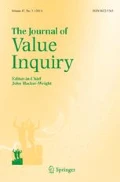Notes
“Modern Moral Philosophy,” Philosophy 33 (1958), pp. 1–19, very frequently reprinted.
Alasdair MacIntyre, After Virtue, second edition (London: Duckworth, 1985).
I shall also not be concerned with the issues that Øyvind Rabbås discusses in his paper in this volume.
Aristotle, Nicomachean Ethics book I. The passages in Plato where he takes care to show that, quite apart from Socrates’ own position, it is universally held that our goal in all we do is eudaimonia, are Euthydemus 278e–282e, Symposium 204e–205a and Philebus 11d4–.
See n 5. This is the point at which contemporary interpreters tend to find difficulties in thinking of eudaimonia as happiness.
Nicomachean Ethics 1120a 24–29.
1106b 18–24, Crisp translation; the relevant word is dei throughout.
1120a 24–31, Crisp translation, with “fine” instead of “noble” for kalon.
See Richard Kraut, “Doing Without Morality: Reflections on the Meaning of Dei in Aristotle’s Nicomachean Ethics,” Oxford Studies in Ancient Philosophy 30 (2006), pp. 159–200.
There has in recent years been a revival of interest of the project of Maurice Mandelbaum, in his book Phenomenology of Moral Experience (Baltimore: Johns Hopkins Press, 1955, 1969). See also Terence Horgan and Mark Timmons, “Prolegomena to a Future Phenomenology of Morals,” Phenomenology and the Cognitive Sciences 7 (2008), pp. 115–131.
For a recent example from discussions of this, see Joshua Glasgow, “Does Direct Moral Judgment Have a Phenomenal Essence?,” Journal of Moral Philosophy 10 (2012), pp. 1–18. Glasgow concludes that it does, arguing against critics that the feelings we have when making judgments about what we ought to do are unified by being felt demands “with an outside-in vector” (p. 9). (He also explains them as categorical; I discuss this aspect below.)
The best-known are W. D. Ross and H. R. Prichard. Thomas Hurka’s introduction to his edited collection of essays on a group of these philosophers, Underivative Duty (Oxford: Oxford University Press, 2011), is illuminating on their methodology, which drew substantive conclusions from actual or alleged ethical responses.
Ross, The Right and the Good (Oxford: Oxford University Press, 1930), p. 3: “If we turn to the sort of moral judgment in which we do use the word ‘right,’ such as ‘this is a right act,’ it is clear that by this we mean ‘this act is the act that ought to be done,’ ‘this act is morally obligatory’.” I will return to the connection with morality.
Mandelbaum, p. 46. Examples from past and present philosophers are easy to come by, once the problem is noticed. Sidgwick says, “When we are talking about someone’s duty or what he ought to do, we often express this by saying that he has a ‘moral obligation’ to do it.” (Methods of Ethics 7th edition, 1907, Part I 3.2.) Peter Singer: “‘I have an obligation to’ means no more, and no less, than ‘I ought to’.” (“Famine, Affluence and Morality,” Philosophy and Public Affairs 1 (1972), pp. 229–243, p. 233 n. 2.)
Ross, op. cit., p. 3.
I support this claim, and expand further on the idea of demands of virtue, in “Why Virtue Ethics does not have a Problem with Right Action,” Oxford Studies in Normative Ethics 4 (2015).
As Rosalind Hursthouse points out in a forthcoming article, Mandelbaum himself (pp. 169–170) holds that the virtuous do not experience the kind of special demand from right action that he is concerned with; it turns out to be an experienced demand only for those who are actually tempted by temptations – the encratic, in fact, in Aristotelian terms.
Author information
Authors and Affiliations
Corresponding author
Rights and permissions
About this article
Cite this article
Annas, J. Virtue and Duty: Negotiating Between Different Ethical Traditions. J Value Inquiry 49, 605–618 (2015). https://doi.org/10.1007/s10790-015-9520-y
Published:
Issue Date:
DOI: https://doi.org/10.1007/s10790-015-9520-y

